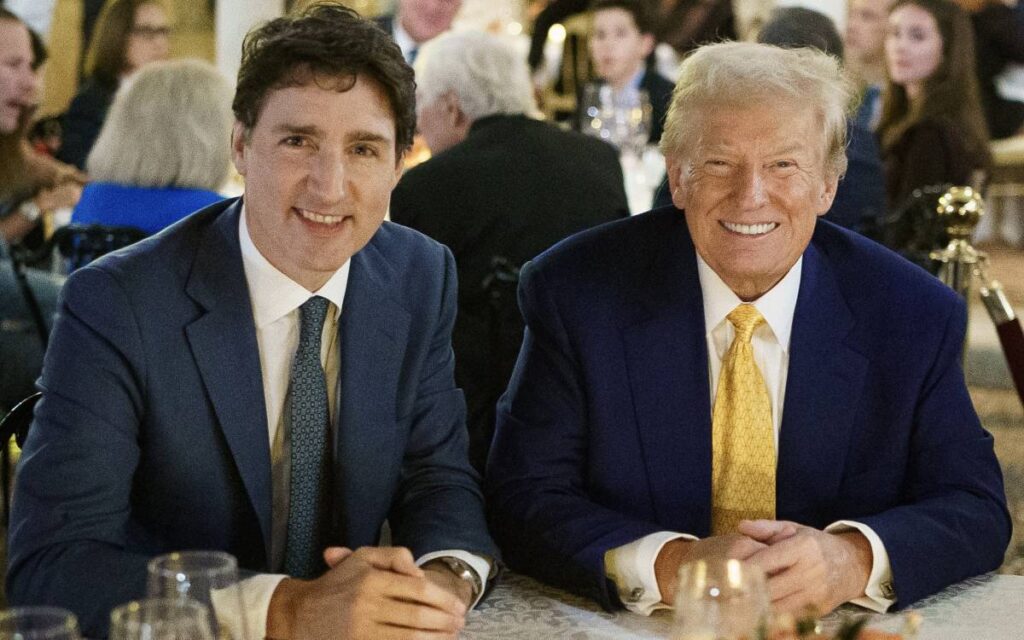
Facing down the bully this time will take a clear-eyed assessment of the cards we do have to play. Pictured: President-elect Donald Trump and Prime Minister Justin Trudeau. Photo Credit: Justin Trudeau/X.
Enough already of the social media tit-for-tat between President-elect Donald Trump, Prime Minister Justin Trudeau and former Bank of Canada Governor Mark Carney. This is what diplomacy has come to in the current era?
Alas, it seems so.
Trump started it with his campaign promise to slap 25 per cent tariffs on Canadian goods crossing the border. He mistakenly believes the U.S. is subsidizing our country because there is a trade imbalance of goods traded between us. It is simply not true: a trade imbalance does not mean a subsidy.
That has not stopped his rhetoric, nor, if his past performance is any indication, it will not stop him taking pre-emptive actions to increase tariffs as he did on Canadian steel and aluminum during his first presidential term.
Canada needs to get its house in order and fast. Trump is sworn in on Jan. 20 with a promise to immediately issue a long list of executive orders to enact his will. Tariffs are likely to be on it.
Unfortunately, Ottawa is in turmoil, seized with the question of Trudeau’s future, “will he or won’t he” resign. His appalling handling of his former finance minister Chrystia Freeland caused her to resign the day she was to deliver a critical economic statement.
A growing number of his caucus are publicly calling for his departure and it appears that a majority of the MPs in the House of Commons are now threatening to bring his government down at the first available opportunity.
Ontario Premier Doug Ford, in his role as chair of the provincial premiers, tried to step into the void by threatening to retaliate with cuts to energy exports should Trump arbitrarily slap tariffs on Canadian goods. Alberta Premier Danielle Smith and Quebec Premier Legault objected to that tactic. So much for a united front.
The stakes are too high for Canada’s and particularly Ontario’s economy to mess this up. One in five Ontario jobs depend on Canada-U.S. trade. The province is the number one trading partner with 19 states and the second largest with nine others. Overall, it is the third largest trading partner with the US and that relationship has been growing.
There is no question that it is tough to figure out how to respond to Trump’s public comments. He habitually makes bullying statements and threats. And it is easy to believe that he doesn’t really mean it, given the damage that the U.S. would also suffer in a trade war.
Professor Stephen Farnsworth, author of the book “Presidential Communication and Character,” says that Trump makes such statements to keep his opponents off balance. “You ask for something unreasonable and it is more likely you can get something less unreasonable,” he has been quoted as saying.
Since his re-election, Trump has escalated things with social media posts and public comments that Canada should become the 51st U.S. state. “Their taxes would be cut by more than 60%, their businesses would immediately double in size,” he claimed. He then “joked” that Canadian hockey legend Wayne Gretzky should run for Prime Minister, or Governor of the 51st state, to use Trump’s words. “You wouldn’t even have to campaign,” he said.
Trudeau responded with a post from an American broadcaster, released during the 2010 Olympics describing how close the ties are between our two countries. Carney’s response was to criticize Trump for “the casual disrespect, the poor tax math and ignoring that workers on both sides of the border would be better off if we work together.”
Some dismiss Trump’s “51st state” comments as his brand of humour. But his tariff threats can be real as we saw from his “America first” policies during his first term.
He almost ripped up one of the most successful trade agreements between our two countries and Mexico, the North American Free Trade Agreement. Canada and Mexico managed to re-negotiate a new deal, the US-Mexico-Canada Agreement (USMCA), but it was no sure thing.
One of its primary purposes was to avoid this kind of one-off, arbitrary, presumptive move by the United States in the future. We will see.
Facing down the bully this time will take both a strong and united political front and a clear-eyed assessment of the cards we do have to play.

Janet Ecker is a former Ontario Finance Minister, Minister of Education, Minister of Community and Social Services and Government House Leader in the governments of Premier Mike Harris and Premier Ernie Eves. After her political career, she served as the founding CEO of the Toronto Financial Services Alliance, a public-private partnership dedicated to building Toronto region into an international financial centre. She currently sits on a number of corporate and non-profit boards, agencies and advisory committees.
Ms. Ecker received the Order of Canada for her public service contributions and was recognized as one of the “Most Influential People in the World’s Financial Centres” by Financial Centres International. She also received a “Canada’s Most Powerful Women: Top 100 Award” from the Women’s Executive Network and the Richard Ivey School of Business, among other awards. She is also one of the founders of Equal Voice, a national, multi-partisan organization working to elect more women.






